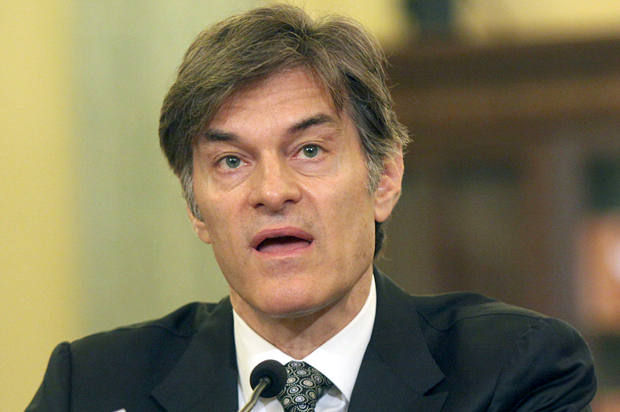For years now, Dr. Mehmet Oz has been a fixture in the uniquely odd world of public American medical “expertise,” first as a trusted guest on “Oprah,” then as a television host and full-scale celebrity in his own right. Yet as his empire has expanded, Oz has faced increasing criticism and controversy for his often-questionable recommendations. But on Tuesday, he got what may be the biggest can of whupass yet opened upon him, during a hearing on advertising and endorsements for weight loss products.
Missouri Democratic Senator Claire McCaskill, chairwoman of the subcommittee on Consumer Protection, Product Safety, and Insurance, expressed disdain and disappointment as she told Oz, “The scientific community is almost monolithic against you in terms of the efficacy of the three products you called ‘miracles.’ I don’t get why you need to say this stuff when you know it’s not true. When you have this amazing megaphone, why would you cheapen your show?… With power comes a great deal of responsibility…. While I understand that your message is occasionally focused on basics like healthy eating and exercise, I am concerned that you are melding medical advice, news, and entertainment in a way that harms consumers.” As CNN reports, just last month the FTC cracked down on the makers of Green Coffee Beans – just one of the many so-called miraculous weight loss products Oz has championed, “for deceiving consumers through fake news sites and invented health claims.”
McCaskill’s rebuke is just the latest blow to the good doctor’s credibility. A year ago, 76-year-old Frank Dietl brought a lawsuit against Oz, claiming he’d received third-degree burns after followed a suggestion he saw on his show to sleep with heated rice-filled socks as a remedy for insomnia. (A New Jersey judge threw out the case last fall.) Oz has, in recent years, used his talk show to “investigate” whether there’s a “cure” for homosexuality and repeatedly welcome Dr. Joseph Mercola as an authority, despite Mercola’s multiple tussles with the FDA over misleading health claims. Oz himself has been slapped down himself by the FDA, by the way, for his incendiary, dubious statements regarding arsenic levels in apple juice. But what he’s undeniably most promiscuous about is his near constant dispensation of advice for “rapid” weight loss and which supplements to take. If you search on his site for the word “miracle,” you will get 1,890 results, which is considerably more than you’ll find in the entire bible and 1980 US Olympic hockey team combined. In just the past few years, Oz has touted everything from raspberry ketones to saffron extract to yakon syrup as “miracles,” “game changers” and “lightning in a bottle.” Yet as Slate noted last year, the evidence to support his claims about many of the supplements he has endorsed for a variety benefits — from weight loss to cancer prevention — are slim to nil.
Long ago, before Oprah and before he was one of People magazine’s sexiest men, Mehmet Oz was just a charismatic doctor with some interesting ideas on integrating alternative and western medicine. Twelve years ago, he was the heart surgeon who helped save my father-in-law’s life. Then he became a star, a man whose job several days a week would involve buzzing up some exciting new breakthrough, preferably involving becoming thinner or younger. Spoiler: medical revolutions don’t happen five days a week. But Oz boldly told the senate panel Tuesday that “My job, I feel, on the show is to be a cheerleader for the audience, and when they don’t think they have hope, when they don’t think they can make it happen, I want to look, and I do look everywhere, including in alternative healing traditions, for any evidence that might be supportive to them.” And what is more healing than a litany of fat busting “miracles,” right?
“I fill a need to fuel passion in peoples’ lives about what they can do,” Oz said Tuesday, though the evidence strongly suggests that what Oz has most successfully done in his recent career has been to help fuel an industry of false hopes and wasted money. He added, “When I feel as a host of a show that I can’t use words that are flowery or passionate, then I feel that my power has been disenfranchised,” which is now the week’s leading contender for Greatest Declaration of Not Getting It. After years and years of striking evidence that the claims of many of the products that have earned his enthusiastic endorsements have been unsubstantiated, disenfranchising Oz’s massively ill-used power is exactly the point here. And it’s a step in a very healthy direction.

